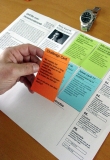 Stem cells, biotechnology, genetic testing, privacy, nanotechnology, neurosciences: nowadays, politics deals more and more frequently with decision making-processes concerning science and technology issues; At the same time there is a growing demand for greater public involvement in establishing science and technology policy.
Stem cells, biotechnology, genetic testing, privacy, nanotechnology, neurosciences: nowadays, politics deals more and more frequently with decision making-processes concerning science and technology issues; At the same time there is a growing demand for greater public involvement in establishing science and technology policy.
But how can society become more effectively involved, beyond giving their views in opinions pools? A game could be a useful tool. From such an idea, Decide, “deliberative citizens debates” project, was launched.
Funded by a grant from the European Commission, DG Research, Science and Society Programme – Scientific Advice and Governance, the DECIDE project was initiated by ECSITE, the European science center and museum network, to further science centers efforts to be active forums for dialogue on complex ethical issues in science and society. The grant provided funding to develop and hold Decide events across Europe at partner institutions.
DECIDE was developed as a tool for people to discuss and gain more insights in science and technology issues in response to needs for having a more involved and informed public throughout Europe. Through a collective table activity played in small groups, it provides an experience in which participants are called to inform themselves on the issues, to discuss them and to finally produce a shared policy option.
DECIDE covers six controversial subjects: xenotransplantation, nanotechnology, stem cells, genetic testing, neuroscience/brain enhancement and HIV/AIDS. For each topic, materials were developed featuring story cards, information and issue cards and a policy voting sheet of four policies with space for a fifth policy to be created by the participants.
In a typical DECIDE event, small groups of 6-8 people read, discuss and debate issue, information and story short texts on a given topic over the course of the event which last for about 1 hour. Near the end of the event participants vote on policies regarding the topic. Policy voting totals are collected by each institution and uploaded onto the DEDICE website www.playdecide.eu. Results are displayed in total as well as country-by country. The website has also a detailed description of the DECIDE activity and all of the materials on each topic which are downloadable and free of charge.
Between January 2006 and July 2006 between 1200 and 1500 people attended 64 DECIDE events (an average of 20 people per event). These events were held in 13 DECIDE partner institutions in 12 EU countries. The Decide materials were translated into 12 languages by partner museums.
The evaluation process conducted by Observa reveals that DECIDE effectively represents a forum that encourages interaction, dialogue and critical analysis of participants’ideas concerning science and technology issues.
One of the most significant and noteworthy accomplishments of the DECIDE project is its role in bringing people from highly different background and ages to the table and then providing a structure and materials that engage these diverse communities in informed discussions on real world issues. Participants expressed particular appreciation of having other perspectives, people with different backgrounds or experience at the table and valued the opportunity to discuss with others the scientific issues put forward by the Decide materials. Integral to this inclusion of diverse points of view is that the DECIDE events were effective in widely different settings, communities and countries.
According to data and information collected, notable changes in participant’s thinking or understanding occurred after participation in a DECIDE event, primarily through increased questions and increase of ethical terms used post event. Other changing factors observed were change of mind about an issue, transfers of ideas to other contexts, and an increased concern about an issue. Discussions were also observed to increase in complexity over the course of the event, going from more simple opinion statements to statements that incorporated ideas from the Decide materials and referred to other people’s perspectives.
Lastly, DECIDE impact went far beyond the initial project and the 13 European partners. Even if it is impossible to completely map all the new institutions, museums and groups that conducted decide events, a number of new uses of decide are documented.
More details about the project, materials and rules of game are available on the official website www.playdecide.eu.
Results and conclusions are published on Decide official website or can be downloaded here.







